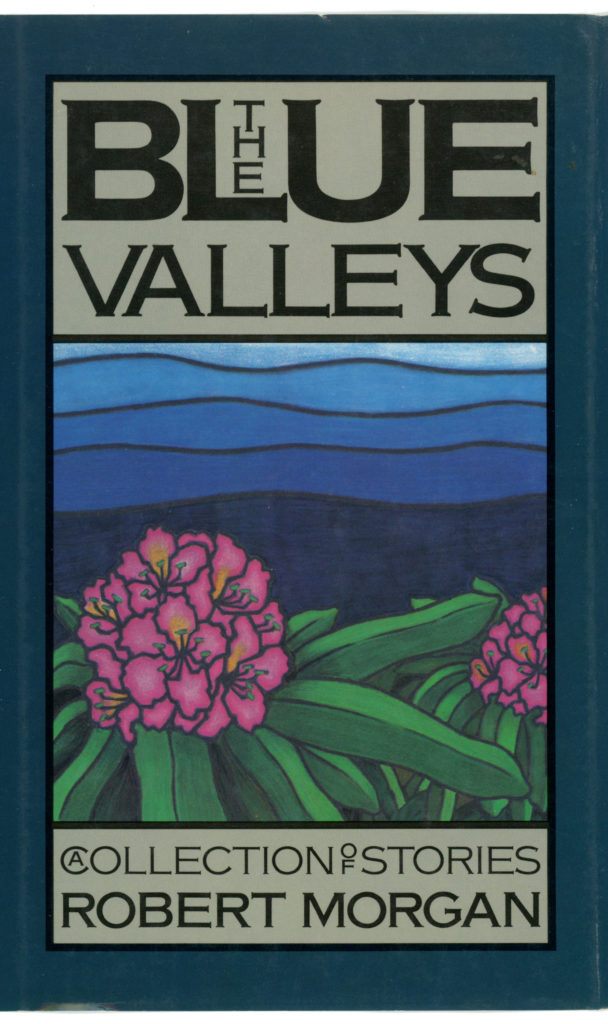This post, illustrating the cover of Robert Morgan’s The Blue Valleys, was originally created in April of 2017. It’s now – in November of 2019 – been updated to include Joanne Kennedy’s 1989 book review from The New York Times, and, the book’s table of contents…
 THE BLUE VALLEYS, By Robert Morgan.
THE BLUE VALLEYS, By Robert Morgan.
(Peachtree, $15.95.)
The New York Times Book Review
Review of Joanne Kennedy
December 10, 1989
The strong, pungent stories in “The Blue Valleys,” a first collection by the poet Robert Morgan, are set in the Blue Ridge Mountains of North Carolina, whose hills and valleys are a sturdy home for his characters, mostly working people at the mercy of circumstance. As these intricate tales progress chronologically from Civil War times to the present, the dignity of simple farm life is complicated by the advent of computers, working wives and disrespectful children, and the land becomes less a source of livelihood than a vital touchstone. In perhaps the best story in the book, “Tailgunner,” a former prisoner of war named Jones realizes that he has spent his life doing things he never wanted to do, married a women he never intended to marry. Wondering why he alone was spared in the World War II crash of a B-24, he encounters his real self only in the pine woods. “It was as though he had forgotten something about himself for almost forty years,” James muses. “He could not explain why the peacefulness of the trees reminded him of instants of great danger and sickness, why he felt close to some bedrock definition, some value.” Similarly, in the story called “A Brightness New and Welcoming,” a soldier dying in the sordidness of a Yankee prison camp during the Civil War thinks about the pristine water of a spring that he had cleared on his home place, and the way the spring, “seemed the dial of some instrument.” The resilience of childhood, the misery of life in a trailer and the humor of December romance are also among the diverse subjects of the stories in this beautifully crafted collection, a procession of tales rich with native detail and character, told in language as plain and deep as the hills, the whole weighed with an awareness of death that looms over the struggle for a meaningful life.
________________________________________
Contents
A Brightness New and Welcoming (originally as “Camp Douglas”), from Jacaranda Review
Pisgah
1916 Flood, from South Dakota Review
Crossties
War Story, form St. Andrews Review
Let No Man, from Maryland Review
Family Land, from Appalachian Heritage
The Lost State of Franklin
Tailgunner
The Half Nelson, from Memphis State Review
Night Thoughts, from Epoch
The Pickup
Blinding Daylight, from Celery
________________________________________
Lorna had never understood the sharpness of her tongue.
It was a habit she had developed as a teenager,
and it had grown on her over the years.
She did not realize how she sounded.
He thought of recording her on tape and then playing it back to her.
She would be astonished at the harshness in her voice,
at the belittling tone of her comments.
She knew how to be polite in public, and with her friends from church.
It was only with him, and with her sisters, that side of her came out.
But she was mostly a good woman,
though he had not meant to spend his life with her.
That was why he seemed so tolerant, why he almost never quarreled.
If he let himself go who knows what he would end up saying.
He might let it out that he had never wanted to marry her,
never wanted to be with her.
It would tear away whatever grace their life had had,
pull down the scaffold and show how badly fitted and supported they really were.
It would ruin her opinion and pride in herself.
His very lack of feeling for her had been the essence of his devotion and patience,
which so many friends had praised,
especially at the times when other friends had divorced.
– “Tailgunner“, by Robert Morgan

